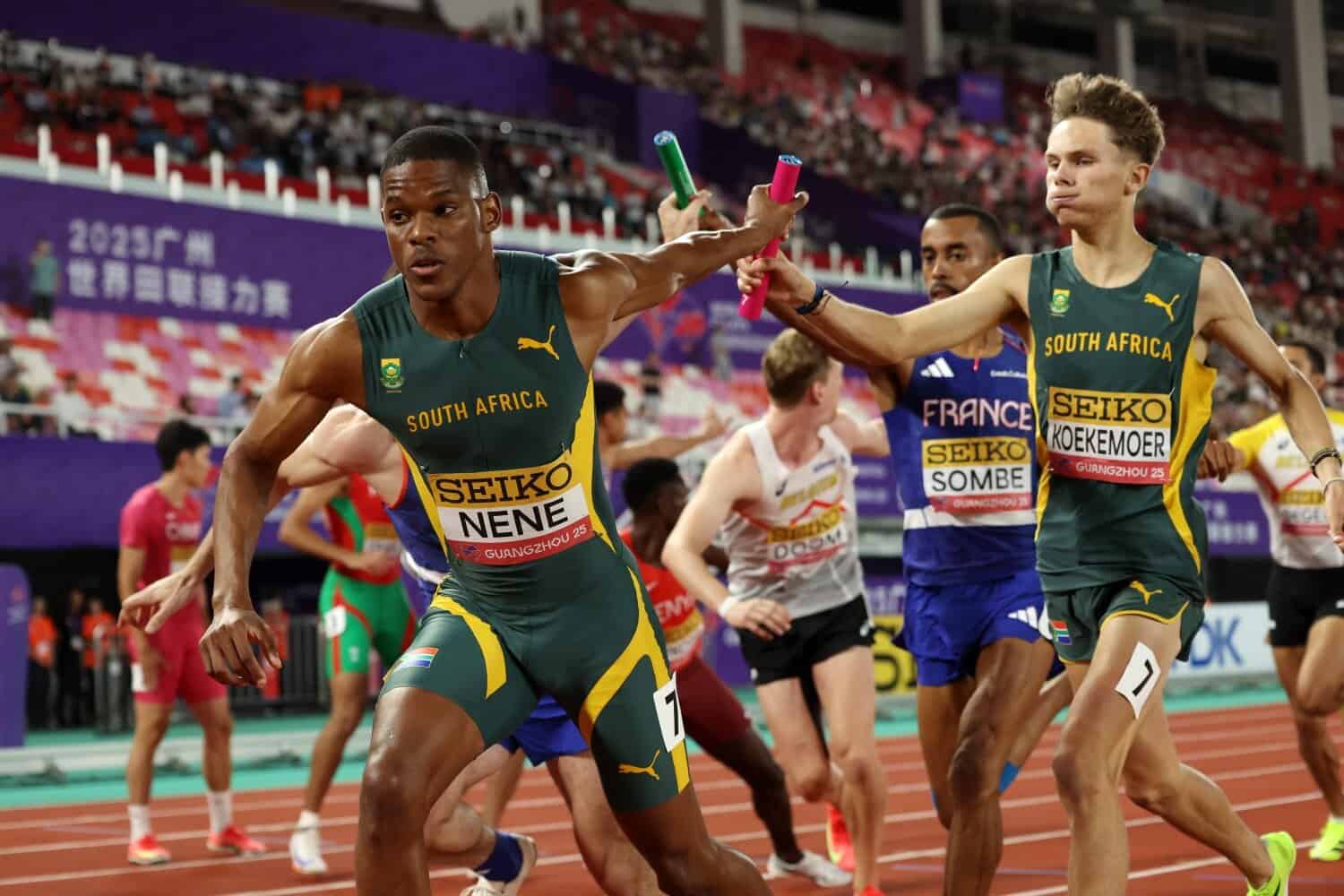South African Athletes at World Championships arrive in Tokyo with a mix of momentum and question marks, their final tune up at the Diamond League final in Zurich offering hard evidence of form and a few late twists to the plan. On the track, Akani Simbine found sub ten rhythm again, Jo-Ané du Plessis climbed the javelin podium, and Bayanda Walaza suffered a painful hamstring blow that could reshape the relay picture. At the same time, the men’s 4x400m relay unit talks openly about medals, with Wayde van Niekerk ready to add experience to a quartet that already owns a global title from the World Athletics Relays.
What Zurich told us about Team SA form
Zurich was both a reassurance and a reality check, the kind of night that sharpens focus before a global championship. Simbine clocked 9.98 for silver behind Christian Coleman, a result that confirmed his speed is trending upward at the right time. For a veteran who managed his season carefully, this felt like a timely sign that the pieces are coming together.
The shock of the evening came when Bayanda Walaza pulled up around 50 to 60 meters, a hamstring issue halting a run he was leading by a fraction. Early indications point to him likely missing Tokyo, a heavy hit for the 4x100m relay plans that had leveraged his top end acceleration on first leg. Relay calculations now shift to depth and order, with coaches needing quick decisions on personnel and roles.
In the javelin, Jo-Ané du Plessis threw 62.26 meters in round one and held on for bronze, a composed performance that fits a season of consistency. With Elina Tzengko taking the win and Adriana Vilagoš the silver, du Plessis still showed she is squarely in the medal conversation if she can edge a meter more in Tokyo. The Zurich podium arrived at the perfect moment for confidence.
Prudence Sekgodiso took sixth in a fast 800m, clocking 1:58.57 in a race sparked by a national record for Switzerland. Her positioning through 550 meters was promising, even if the late burn down the home straight left her slightly off the pace. If the rounds get tactical, her race craft keeps her in the mix.
Zenéy van der Walt returned to a top international stage and battled through to eighth in 56.90 in the 400m hurdles, in a race won decisively by Femke Bol. There is no panic in her camp, with attention on rhythm and stride pattern through hurdles seven to ten. In the pre program, Rogail Joseph posted a season’s best 56.00 for fifth, a positive marker two weeks from the championship start.
Shaun Maswanganyi completed a busy men’s 100m for South Africa, seventh in 10.19 after a strong start that faded late. With relay decisions looming, his experience becomes even more relevant. Every clean handover and reliable drive phase matters when medals are at stake.
Men’s 4×400 relay belief grows in Tokyo
Confidence is unmistakable in the 4x400m squad that lifted gold at the World Athletics Relays in Guangzhou. The quartet featuring Zakithi Nene, Gardeo Isaacs, world junior champion Udeme Okon and 18 year old phenom Leendert Koekemoer has already proved it can deliver under pressure. Now the conversation turns to upgrading ambition on the World Championships stage.
“As a team, we have a big desire to get ourselves amongst the medals in the 4x400m, and that’s really been something I wanted to be a part of for a very long time now,” said Wayde van Niekerk, who is eager to give the squad an extra boost.
Van Niekerk, the world record holder at 400m with 43.03, has shown encouraging speed over the half lap, running 20.07 in Budapest, his quickest since his 2017 World Championships silver in the 200m. He is realistic about the challenge in the 200m this year, with 24 men faster including national champion Sinesipho Dambile, yet his presence around the relay group radiates belief. Big championship experience can steady a relay in the chaos of heats and finals.
“My health is looking good and the body has been responding well,” Van Niekerk said after departing from OR Tambo International.
Zakithi Nene carries headline one lap credentials after clocking 43.76 in Nairobi, the fastest 400m of the year when he ran it in May. He picked up a grade two hamstring tear in warm up four weeks ago and has not raced since, yet he insists he is ready to anchor if called. “I’m all good. Recovery has been going well… and I’m in the best possible shape now going into worlds,” he said.
Akani Simbine balances patience and hunger
This season has been unconventional for Simbine, and he embraced that from the start. He opened his year on the indoor circuit for the first time, taking bronze in the 60m at the World Indoor Championships in Nanjing. Then came a streak of three Diamond League 100m wins, followed by a deliberate mid season break.
The return brought a few results outside the top three before Zurich flipped the mood with a 9.98 silver. The time, just a blink behind Coleman, suggests he is sharpening right on cue. “This has been a very different year for us, but everything has been going well and according to plan,” he said, adding that he feels very confident.
“The body is feeling good, I’m feeling good and I’m very confident going into this weekend.”
There is also a deeper layer to his pursuit of an individual global medal. Simbine has been one of the most consistent 100m sprinters in the world for a decade, finishing top five at six global championships since 2016 and leading South Africa to silver in the 4x100m at the Paris Olympics last year. The pain of fourth in Tokyo in 2021 has been processed, and turned into fuel rather than baggage.
“I think at that time the maturity was not there, and for me it exposed a lot of inner weaknesses that I had to go back and work on,” he reflected, grateful for the lessons that followed.
Javelin and middle distance keep medal hopes alive
Du Plessis has been quietly building a resume that belongs in any medal discussion. Her 62.26 in Zurich, good for bronze, was no outlier, and the consistency of her series matters in high pressure finals where early marks can change tactics. With mid 62s frequently contending at global level, she needs only a modest bump to be right in the thick of it.
Prudence Sekgodiso’s 1:58.57 was set in a scorching race where a national record fell, the kind of environment where lessons multiply. Her strength through the rounds, and her capacity to navigate the traffic of championship 800s, are real assets. If Tokyo’s semifinals turn cagey, her instincts through 200 to 600 meters could prove decisive.
The 4×100 relay puzzle after Walaza
Walaza’s season captured the imagination at the World University Games when he won the 100m in 10.16, a statement run that underscored his big meet temperament. That is why his Zurich hamstring injury, suffered while slightly in front at halfway, stings so much for the relay unit. Early signs point to him missing Tokyo, which forces a rethink of personnel and ordering.
Maswanganyi brings stability and experience, and Simbine’s sub ten shape is a crucial anchor card. The staff must decide how to replace the burst Walaza supplied out of leg one and how to balance starts and top end speed across the quartet. Relay medals are as much about cohesion as they are about raw time.
Notes from the World University Games that add context
Rhine Ruhr 2025 delivered a cross section of the next wave and the ready now. Alongside Walaza’s 100m gold, Gabriella Marais took bronze in the women’s 100m and Lythe Pillay won his 400m semifinal in 45.53 to reach the final. There were near misses and setbacks too, with Tumisang Shezi and Zeney van der Walt both affected by health and injury during that period.
Those stories feed into Tokyo because they show both depth and fragility. South Africa’s pipeline is producing finalists, and the senior group now has to convert chances under the biggest spotlight. Momentum is real, but so is the need for clean execution in every round.
What to watch in Tokyo
- Simbine’s start and relaxation through 60 meters,
- the health and role of Nene in the 4×400 relay and whether Van Niekerk features,
- du Plessis chasing an extra meter that turns a podium into a title chance.
- Sekgodiso’s positioning in heats and semis,
- van der Walt’s rhythm between hurdles seven and ten,
- the 4×100 relay reshuffle after Walaza and how baton chemistry holds under pressure.
Bottom line for Team SA
Zurich brought a silver for Simbine and a bronze for du Plessis, which is the kind of tangible evidence that boosts belief. It also brought a relay headache, with Walaza’s injury casting a long shadow over sprint plans. The next days are about clarity, recovery and precise choices that maximize the strengths already on display.
The men’s 4x400m group speaks the language of medals and has results to back it, and Van Niekerk’s presence amplifies that energy. In individual events, Simbine’s late season rise, du Plessis’s consistency and Sekgodiso’s savvy point to real possibilities. Tokyo now asks for calm execution, because the margins will be thin, and South Africa’s athletes have already shown they are ready to fight for them.






